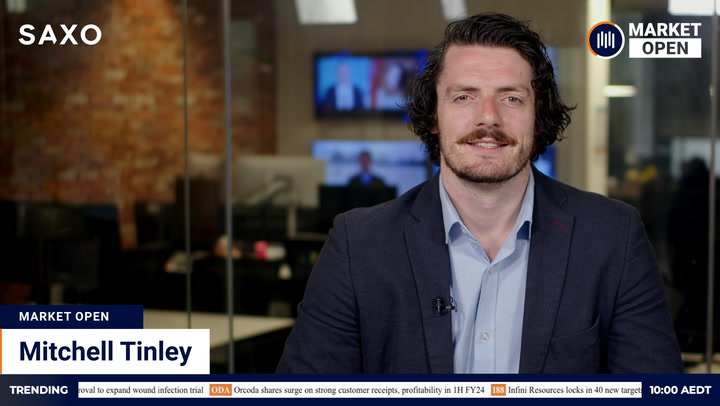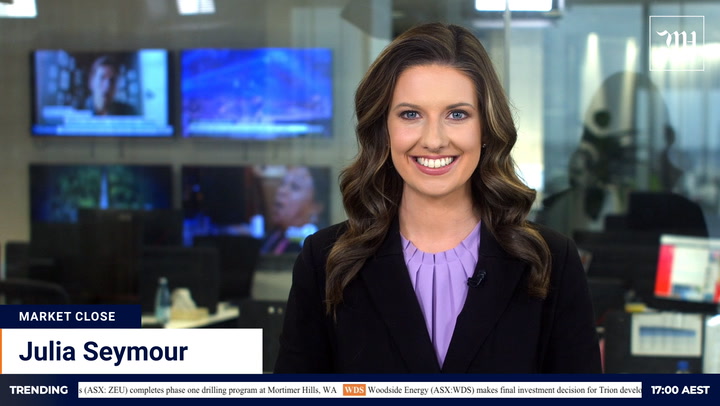The share market faces early pressure following declines on Wall Street after record producer prices increased the heat on the Federal Reserve to tighten monetary policy.
US stocks fell for a second night as the Fed commenced a two-day meeting. Oil, copper and gold declined. The dollar pulled back to 71 US cents.
ASX futures dropped 29 points or 0.39 per cent. A fall of that scale would push the S&P/ASX 200 into the red for the week following a modest advance on Monday and a directionless session yesterday.
Wall Street
US stocks fell sharply at the open after wholesale inflation showed the biggest year-on-year increase on record. Stocks pared losses in afternoon trade as long-term interest rates came off session highs.
The S&P 500 trimmed its decline to 35 points or 0.75 per cent. The Dow Jones Industrial Average shed 107 points or 0.3 per cent. The Nasdaq Composite lost 176 points or 1.14 per cent as Big Tech bore the brunt of the selling.
The November producer price index climbed a hotter-than-expected 0.8 per cent last month for a year-on-year increase of 9.6 per cent, the largest since the series began. Economists polled by Dow Jones had expected smaller increases of 0.5 per cent for the month and 9.2 per cent for the year.
“The story for much of 2021, or certainly the last six months has been inflationary signs that have been more and more concerning,” David Keller, chief market strategist at StockCharts.com, said.
The report came as the Federal Open Market Committee started a two-day meeting to set quarterly projections for the economy. The central bank is expected to discuss reducing support for the economy faster, paving the way for interest rates to rise by the middle of next year.
“Fed Chair [Jerome] Powell has a very difficult communication job ahead of him [tonight]. We’re in line with consensus and expect the Fed to end its tapering program in March/April and start hiking in May,” Wolfe Research strategist Chris Senye told clients.
“If Fed Chair Powell emphasizes that the FOMC remains flexible, the ‘Fed put’ should remain in place. However, if his tone is overly hawkish, it could turn into a disaster like December 2018.”
Growth stocks led the selling for a second night after the yield on ten-year US treasuries spiked in response to the inflation report. The yield briefly jumped almost six basis points before halving its advance.
Microsoft shed 3.26 per cent, Alphabet (Google) 1.32 per cent and Tesla 0.82 per cent. Apple, Amazon and Meta Platforms (Facebook) also declined.
Covid worries remained near the surface after the World Health Organization warned the new omicron variant was spreading faster than previous strains. Seventy-seven countries have reported cases.
“Omicron is spreading at a rate we have not seen with any previous variant,” WHO Director-General Tedros Adhanom Ghebreyesus said.
“Even if omicron does cause less severe disease, the sheer number of cases could once again overwhelm unprepared health systems,” he added.
Australian outlook
A soft open coming up, but ASX futures finished the night session well above their lows. Wall Street recovered into the closing bell as investors positioned for tonight’s Fed policy announcement.
This week’s US action has been fairly typical of the lead-up to contentious Fed decisions. Equity prices retreat in the countdown to the announcement as investors reduce exposure, then start to recover as traders buy the dip. The Fed has communicated its intentions well, so tonight’s update seems unlikely to trigger the sort of market tantrums seen in 2013 and 2018.
The S&P/ASX 200 quickly overcame yesterday’s opening weakness, finishing the session less than a point lower after earlier falling as much as 38 points. Mining and defensive stocks led the turnaround.
Lenders were the night’s big winners in the US as market rates rallied. The financial sector climbed 0.63 per cent.
Rate-sensitive growth stocks and bond proxies sold off. The technology sector sank 1.64 per cent, real estate 1.27 per cent and utilities 0.63 per cent. The materials sector was among the best of the losers with a deficit of 0.11 per cent.
Back home, Westpac holds its annual general meeting today. The bank’s December consumer sentiment survey is due at 10.30 am AEDT.
China releases monthly data on retail sales, industrial production, employment and asset investments at 1 pm.
IPOs: Armada Metals lists at 12.30 pm. The miner is targeting nickel-copper sulphides in southern Gabon.
The dollar retreated 0.4 per cent to 71.02 US cents.
Commodities
Oil settled at its lowest level in a week after the International Energy Agency warned the omicron Covid variant would dent demand. The agency cut its 2022 demand forecast by 100,000 barrels a day.
“The case for oversupply in the next quarter continues to build strength,” Robbie Fraser, global research & analytics manager at Schneider Electric, said. “The IEA announced oversupply conditions were already being recorded in the current market, mainly as a result of the omicron variant helping to reduce international travel.”
Brent crude declined 69 US cents or 0.9 per cent to settle at US$73.70 a barrel. The US benchmark, West Texas Intermediate, fell 0.8 per cent to US$70.73.
Gold slipped to its weakest in almost two weeks as the US dollar firmed ahead of tonight’s Fed decision. Metal for February delivery settled US$16 or 0.9 per cent lower at US$1,772.30 an ounce. The NYSE Arca Gold Bugs Index retreated 1.51 per cent.
“Should the Fed step up the gear on tapering, this is likely to punish gold prices as the dollar appreciates, yields rise and rate hike expectations jump,” Lukman Otunuga, manager, market analysis at FXTM, told MarketWatch.
A fourth straight increase in inventories at London Metal Exchange-registered warehouses weighed on copper. Stocks have increased from 74,225 tonnes on December 6 to 87,275 tonnes this week. March copper fell 0.6 per cent to US$4.258 a pound.
BHP‘s US-listed stock climbed 0.75 per cent overnight. The miner’s UK-listed stock put on 1.98 per cent. Rio Tinto gained 0.76 per cent in the US and 2.23 per cent in the UK. The spot price for iron ore landed in China slipped US$1.95 or 1.8 per cent to US$108.25 a tonne.







